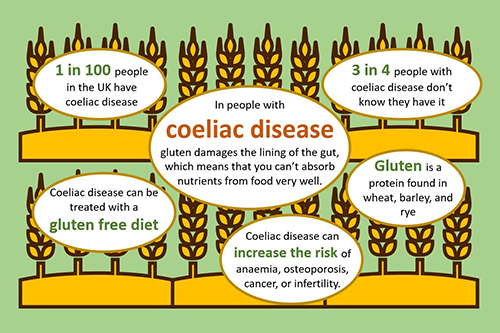Coeliac disease is when a person’s immune response to gluten attacks the tissues in their digestive system. This leads to damage in the gut, which makes it more difficult to absorb important nutrients from food. Around one in 100 people in the UK have coeliac disease, although many are not diagnosed. Untreated patients have an increased risk of anaemia, osteoporosis, cancer, or infertility. The only treatment available is a gluten-free diet.
Diagnosing coeliac disease can be difficult. Some patients may be asymptomatic, while others have non-specific symptoms such as indigestion or bloating. It’s thought only 30 per cent of people with coeliac disease are actually diagnosed.
Guidelines recommend that adults and children "at high risk" of coeliac disease should be offered testing. However, it is not clear which groups are at high enough risk to justify routine testing, which symptoms should lead to testing, which tests should be offered, and whether a biopsy to confirm the diagnosis is necessary. In a biopsy for coeliac disease, the doctor inserts an endoscope through your mouth or nose to take tiny pieces of the lining of your small bowel. This is an unpleasant but safe procedure.
With this survey, the research team want to find out how sure people want to be that they have coeliac disease before starting a gluten-free diet. It takes about 20 minutes and participants will watch some short videos that tell you more about coeliac disease and the gluten-free diet. These are followed by some questions. Anyone living in the UK can participate. By filling out this survey you can win a £50 Amazon voucher.
The survey is part of a larger project to find the best testing strategy for diagnosing whether people have coeliac disease. The new testing strategy developed through this project has the potential to increase the number of people being diagnosed, speed up the process of diagnosis and improve patient outcomes.
Dr Martha Elwenspoek, Research Associate at NIHR ARC West and Bristol Medical School: Population Health Sciences, who is leading the survey work, said: "The results of this survey could have a huge impact, changing the way patients with coeliac disease are diagnosed in the UK. With so many people with coeliac disease going undiagnosed, or waiting many years for their diagnosis, this could be life changing for many people. Whether you have a coeliac diagnosis or not, this is a really important survey to participate in."
Complete the coeliac disease survey here: https://meded.onlinesurveys.ac.uk/coeliac-disease
